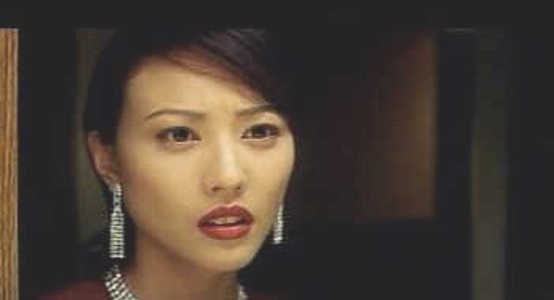
Reviewed by YTSL

Take stylistic elements and references from "Lost and Found", "Chungking Express" and "The Longest Nite" (Along with the director of the 1996 UFO production plus someone who starred in that and what is arguably Wong Kar Wai's most delightful offering). Throw them into a dark brew that is peopled by a more culturally mixed group of individuals than one might expect to see in a film from a country "known" for its relative ethnic homogeneity (And note that the Chinese depicted here are sub-divided into Taiwanese, Shanghainese, Beijingers and Fujianese (a.k.a. Fukienese or Hokkien); plus Japanese Manchurians and others do figure in the picture as well). Come up with an involving thriller of a noir drama involving at least one mystery woman and a few rival underworld gangs (Mainly Triad types, with Yakuza only mentioned in passing). Situate it for the most part in a section of Tokyo known as Kabukicho. In a nutshell, that seems to be what those behind this Japan-Hong Kong -- and also Taiwan? -- co-production have done.
There is much to observe, process and keep the brain occupied in the beautifully filmed -- check out the tracking shot that accompanies the opening credits and other money shots by HKFA Best Cinematography award-winning Arthur Wong -- SLEEPLESS TOWN; so much so that this (re)viewer found herself unable to get through this busy work in one go. First and foremost is the transnationalism -- even if it is mainly restricted to East Asia -- of its references as well as characters plus the multi-linguality of its dialogue. Re the former: Children of Japanese women abandoned in China after the end of the Second World War figure prominently in this 1998 effort; and significant mention is made to there being parallels between characters of this contemporary tale with some in the classic "Romance of the Three Kingdoms" (a piece of literature which Takeshi Kaneshiro's Ryu Kenichi/Liu Jianyi character loaned to Eric Tsang's Yuan Chenggui to read). Re the latter: It may interest some to realize that conversations in this Lee Chi Ngai helmed cinematic adaptation of a novel by Seishu Hase take place in Taiwanese as well as Japanese and Mandarin (but not -- at least, not that I noticed -- Cantonese).




My rating for this film: 8
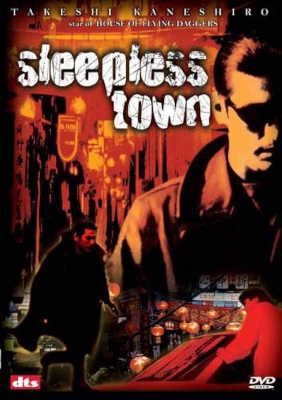
"Don't fuck with the Chinese.
This is Kabukicho" says one cop to another. Kabukicho is part of Shinjuko.
It is the heart of the entertainment area with hundreds of small bars, narrow
winding back-alley streets, hostess establishments, casual restaurants that
cater to the diverse ethnic population that rules and runs Kabukicho. It
goes all night and has acquired the name Sleepless Town. The audience is
introduced to this area during the opening credits as a lovely tracking shot
follows Kenichi (Takeshi Kaneshiro) as he walks through the streets, past
the female touts trying to drag customers in, the drunk salary men vomiting
in the corner, deals being struck, merchandise being picked up, down alleys
and finally into the back room of a hostess bar where the girls are relaxing.
Along the way Kenichi has acknowledge many with a nod or a handshake. He
is a known quantity to everyone. Part of the fabric. He etches out a living
by knowing everyone and knowing how to get things done. But he belongs to
no gang, instead perilously navigating the various yakuza and triad gangs
that control the area. Where crossing someone is as easy as crossing the
street, but the repercussions are much worse. But this is where he makes
his living. In the shadows. He is half Taiwanese and half Japanese and not
claimed by either. He calls himself a bat - surviving by his radar.
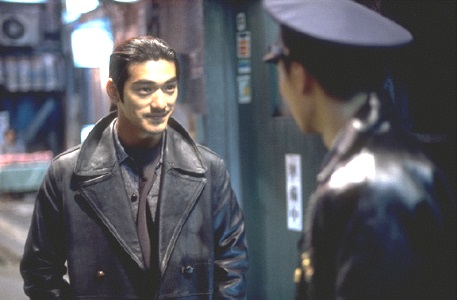
This Hong Kong/Japanese co-production is noir down to its fetid roots. Set in the neon infested streets it is a complex tale of gangs, betrayals, femme fatales and lies. The Chinese triads are well established - from Shanghai, Bejing, Fukienese and Taiwan all vying for power and money. in a small area. Alongside are criminals from Japan, Thailand and Korea. It is diversity at its finest. They all have their territories delineated but they all want more. One gang head warns Kenichi, a storm is brewing. Sacrifices must be made. The trigger is the return of Wu Fu-chun (Shiina Kippei) to Tokyo. He was once a partner of Kenichi but two years previously he had killed the number two man in the Shanghai triad run by Yuan (Eric Tsang) and had left town and not been found. Now he was back. No one knows why. Yuan calls Kenichi into his office. You have three days to deliver your partner to us. Ex-partner he reminds him. Three days.
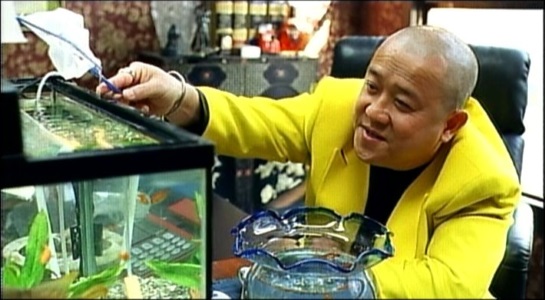
Mr. Yang (Lung Shihung - father in Eat,
Drink, Man, Woman, The Wedding Banquet, Pushing Hands) who runs the Taiwanese
triad tells Kenichi, you might want to leave town. Mr. Ye (Seijun Suzuki)
who is the Big Boss says he has a place for you in Hong Kong. Not his style
- he likes living on his wits. But pretty much loses them when the femme
fatale latches on to him like a bristly cactus. She calls him saying she
needs his help. “I shouldn’t have gone into her apartment. I shouldn’t have
unlocked her trunk”, Takeshi later rues to himself as the metaphorical loose
tightens around his neck in this enigmatic noir suspense tale that takes
place in the shadows of the Chinese underworld in the heart of Tokyo. He
opens the door and he unlocks the trunk though and finds himself playing
the perfect unwitting pawn in a lethal power struggle that consists of hidden
ambitions and double and triple crosses. Every good noir film needs a good
Femme Fatale and Mirai Yamamoto is deliciously mysterious as she shifts in
the blink of an eye from sexual siren to damsel in distress – pulling Takeshi’s
strings – or is he pulling hers – as they circle one another in a dangerous
dance of desire and suspicion.
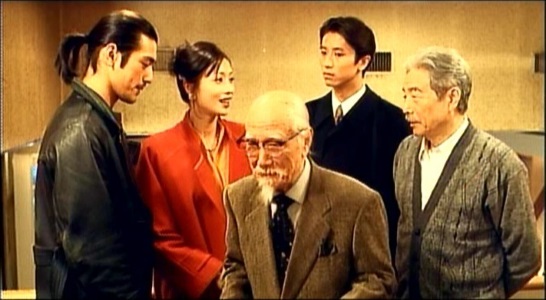
She has more stories than Uncle Remus and as one comes undone, she has another ready made. He knows she is poison but keeps taking sips. Natsumi (Mirai Yamamoto) is beautiful and full of sexual desire. But it is like sleeping with a bed of scorpions. She wants to kill Wu Fu-chun like everyone else does. But then there are plots and plans within plots and plans - everybody is ready to shoot someone in the back. The storm is here in one murderous night after a long build-up.
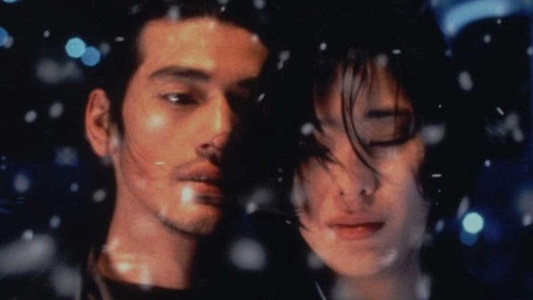
The film is beautifully shot - the director
is Lee Chi-ngai with some fine credits to his name - a bunch that he directed
for UFO - Lost and Found, Mack the Knife, He Ain't Heavy, He's My Father
- but I would guess that much of the credit also has to go to his cinematographer,
Arthur Wong Ngok-tai who has an amazing resume with Eastern Condors, Miracles,
Armour of God, Moon Warriors, Big Bullet, The 36th Chamber of Shaolin, Aces
Go Places and so many more. So, it is hard to tell where the clear Wong Kar-war
influence came from - especially Fallen Angels - the saturated colors, the
music (a Faye Wong song comes on the radio), the unsettling tone, the internal
narrative. If Wong Kar-wai had ever done noir, it would look like this. I
think it is a terrific film - at two hours some of the love making scenes
between the two could have been cut. They bring the film to a halt but perhaps
needed to demonstrate his growing obsession. In the film there is also Kathy
Chow as the mistress of a club owner who like everyone else has her own agenda.
7.5 to 8.0 - 1998
